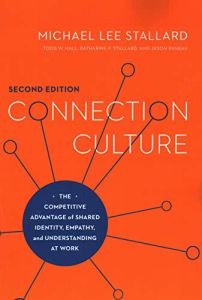Join getAbstract to access the summary!

Join getAbstract to access the summary!
Michael Lee Stallard
Connection Culture
The Competitive Advantage of Shared Identity, Empathy, and Understanding at Work (Second Edition)
ATD, 2020
What's inside?
Give your employees connectedness to improve their health, happiness, engagement and productivity.
Recommendation
Employee engagement expert Michael Stallard updates his valuable first edition of Connection Culture by addressing the impact of coronavirus on working people who are already suffering loneliness and disconnection. He makes an impassioned and informed plea for prioritizing organizational belonging and connectedness to improve workers’ health and productivity. He and his contributors – Todd W. Hall, Jason Pankau and Katharine P. Stallard – join a chorus of scientists, experts and social commentators who warn of the dire consequences of ever-increasing isolation. The book’s compelling mix of science, workplace stats and medical data makes the case that “social connection” is a fundamental human and workplace need.
Summary
About the Author
Michael Lee Stallard is the co-founder and president of the leadership training and coaching firms E Pluribus Partners and Connection Culture Group.Contributors: Todd W. Hall teaches psychology at Biola University. Jason Pankau is a lecturer. Katharine P. Stallard is a partner in the Connection Culture Group.






























Comment on this summary